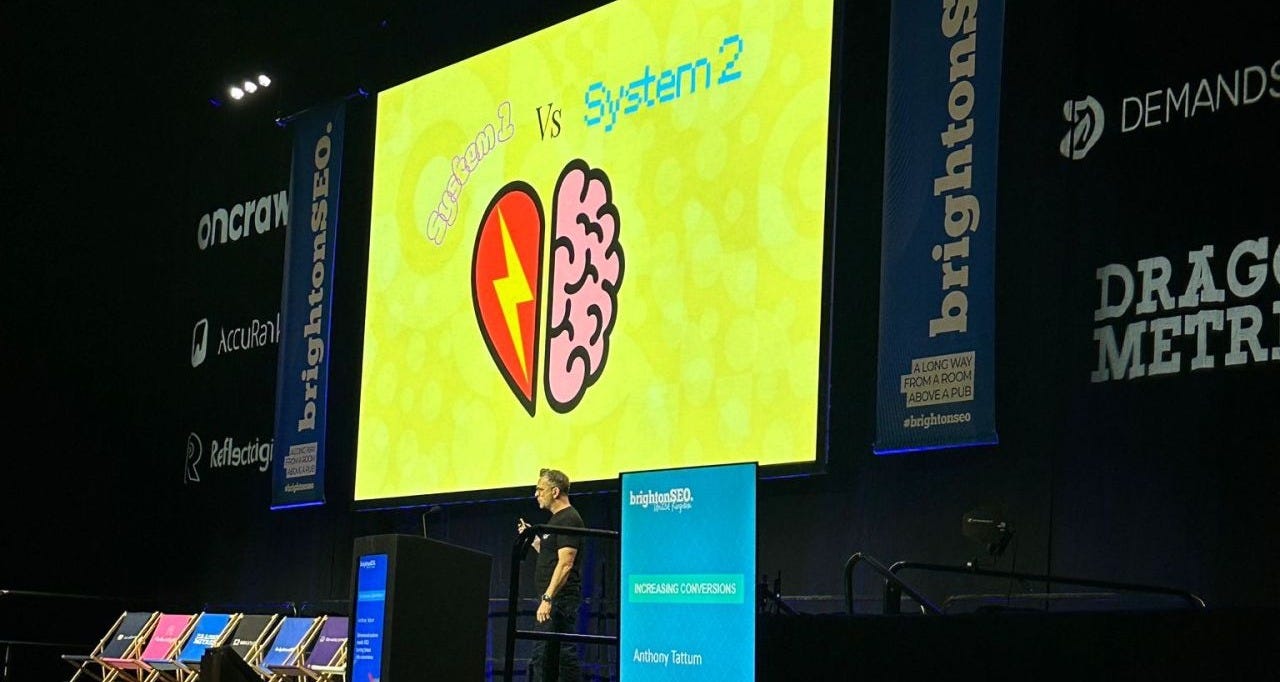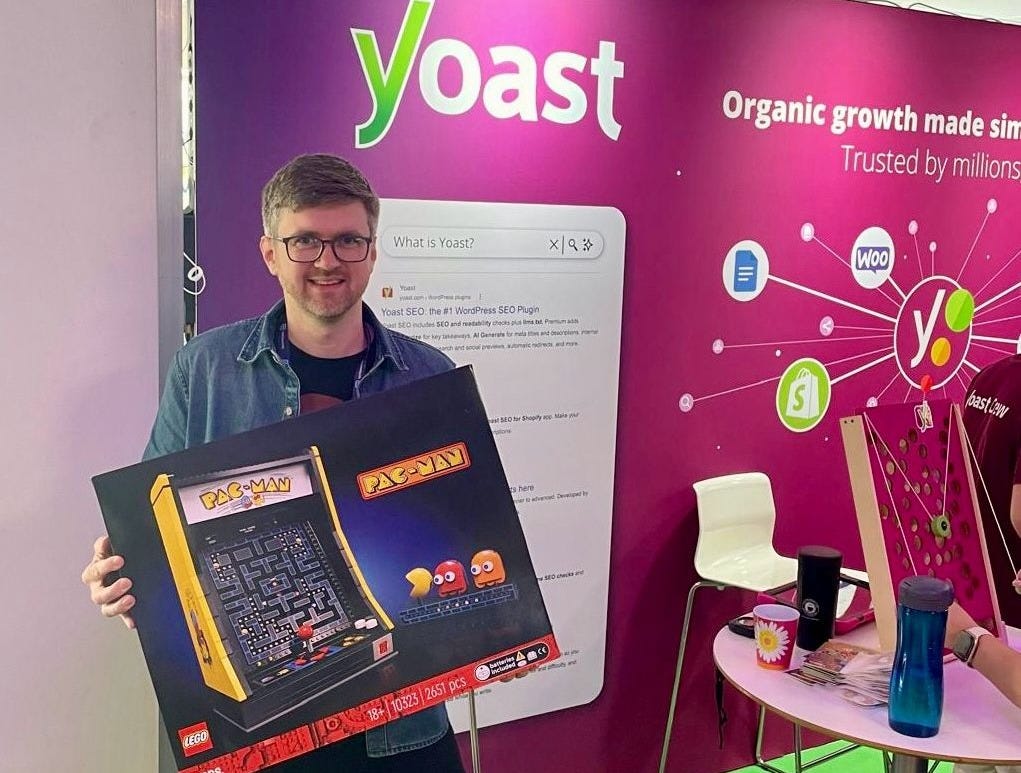BrightonSEO: Notes, Nuggets & Nerdiness From The Stage
SEO TL;DR #87 03/11/2025
This week I’m sharing my notes from BrightonSEO, which was genuinely one of the best events I’ve been to in a while. It was great catching up with a few familiar faces (and plenty of new ones), and I came away with loads of ideas I’ve already started testing - which hopefully explains why this issue is a week late!
Half-term holidays also played a part, and I’ve been balancing SEO fun with family fun. This round-up covers day one only (there’s work to be done), but I’ll share notes from day two soon 😅
There was so much packed into every talk that I couldn’t do it all justice here, but I’ve done my best to summarise the key points and share one takeaway from each session.
Increasing Conversions
Inyene Udom: The Invisible Gaps That Kill Conversions
Inyene kicked off the event with a talk on mind the gap - the three invisible conversion killers:
Above-the-fold black holes – giant banners with no context. Within 3 seconds, users should know what you do, who you help, and why they should stay.
Weak or missing CTAs – never assume users know what to do next; clearly spell out the next steps.
Footers that forget to convert – if visitors scroll that far, guide them to the next step.
💡 Takeaway: Audit every section for clarity, intent, and purpose - each scroll depth should tell users where to go next.
Rashdeep Kelf: Enhancing Customer Experience
Rashid focused on helping shoppers find products faster by layering multiple discovery options, including LiveChat (with AI or human assistance), comparison tables with “show differences” toggles, and product pages packed with rich assets such as manuals, data sheets, and user-submitted FAQs.
💡 Takeaway: Give users every route to clarity, especially for technical products, and you’ll feed both conversions and AI visibility.
Anthony Tattum: Behavioural Science Meets CRO
Anthony reframed CRO through the brain’s two systems: System 1 (fast, emotional) and System 2 (slow, rational).
Marketers often design for Spock, but should optimise for Homer - appealing to instinct, not logic. He shared quick-win tests for emotional triggers:
Scarcity > “Low stock” tags > track add-to-basket rate
Social proof > “Trending now” badges > track click through rate
Endowment effect > add the customer’s name to the cart > track checkout completion rate
💡 Takeaway: Every emotional cue should have a measurable outcome. Test it, don’t assume.
Landing Page Optimisation
Pete Heslop: What Websites Can Learn from Hospitality
Pete drew parallels between hospitality and web design, framing his talk around the three A’s:
Arrival – the look and feel that matches your ideal customer (technical vs reassuring).
Atmosphere – smart UX and imagery aligned with audience expectations.
Appetite – the psychology of persuasion: scarcity, familiarity, trust.
Some great examples from the likes of Monzo, who seem to be making efforts to convert the older generation with larger fonts, reinforcing safety (Which Recommended Provider, humans on hand 24/7), and the ability to log in without a phone
💡 Takeaway: Treat your site like a restaurant - make guests feel welcome, comfortable, and wanting dessert.
Christian Goodrich: Black Friday Strategies
Christian raced through a practical framework for build-up, peak, and last-call phases of Black Friday, blending SEO and PPC tactics.
He emphasised strengthening USPs and CTAs using supplemental feeds, adding urgency and social proof to landing pages, and tracking “Fake Friday” (the mini peak a week before).
💡 Takeaway: Plan for multiple peaks, sync messaging across paid and organic, and test psychological triggers that push hesitant shoppers over the line.
A super valuable talk for this time of year, and there’s a free Black Friday planner and a link to the slides over on LinkedIn.
Joe Gregson: Integrating CRO with GA4
Joe tied the series together by showing how to connect CRO tests with GA4 tracking to measure performance during and after experiments.
He covered practical ways to log experiment variants, compare engagement metrics, and ensure reliable attribution once tests conclude.
💡 Takeaway: CRO doesn’t end at the experiment. Build analytics frameworks that prove (or disprove) impact.
Automation
Charlie Morley-Harman: Google Apps Script
Annoyingly, I missed the first 5 minutes thanks to my terrible sense of direction, but caught the end of a practical session sharing SEO-focused Google Apps Scripts that connect with Screaming Frog data extraction to streamline keyword research, audits, and other repetitive workflows.
💡 Takeaway: Combining Screaming Frog exports with Apps Script can turn manual SEO grunt work into scalable, automated processes.
Alain Schlesser: The AI SEO Stack
Alain showcased how to build a custom LLM-driven marketing stack, automating much of the SEO and content lifecycle. Using a fun Los Pollos Hermanos example, he demonstrated how AI can manage everything from keyword clustering to campaign planning.
💡 Takeaway: I’ve got some homework for this one as it’s a lot to get through in 20 minutes! The future of SEO is augmented, not replaced—either learn to orchestrate AI tools or risk falling behind.
Yoast were also exhibiting with what I have to say was the best stand after winning the Lego Pacman prize (my son was buzzing). I’ve used Yoast for what must be 10+ years now on WordPress sites, but I didn’t realise they have a Shopify app, which I’m keen to try.
Michael Chidzey: Optimising for AI Agents and Humans
Michael explored the emerging world of AI agents, referencing Wired’s article: I Let AI Agents Plan My Vacation and It Wasn’t Terrible.
He warned that AI agents (either forced on you through AI Overviews/Mode or browsers like Comet) are already influencing discovery.
He encouraged SEOs to understand how agents crawl, interpret, and cite sources to gain what he called an “agentic advantage.”
💡 Takeaway: Optimise for humans and the algorithms acting on their behalf - structure data so agents can find, trust, and reference your content.
It was great to meet him in real life after being a guest on SEO Office Hours podcast a few weeks before. Definitely check that out if you want to keep up to date on all things SEO and potentially ask a question.
Zero Click SEO
Jack Chambers-Ward: Content Finds a Way
Sporting a Jurassic Park shirt and backed up by a range of entertaining GIFs, Jack tackled the Zero-Click Era topic with optimism. His core message was that we can’t fight the AI wave; we have to adapt to it (unfortunately, you can’t sue your way to visibility.
He framed SEO as Search Everywhere Optimisation, encouraging brands to show up wherever your audience spends their time - newsletters, podcasts, forums, videos, even WhatsApp groups.
💡 Takeaway: Start by diversifying your content, then build and engage a community through personalised, premium experiences. You can’t be everywhere, so focus on where your audience and LLMs already are.
Peter Serraris: What Log Files Reveal About Zero-Click
Peter shone a light on log file analysis, an often-overlooked but powerful way to identify which bots are hitting your site. With bot traffic soaring, he showed how adjusting crawl delays can save bandwidth and server load.
Highlights included a live demo (with Jack) showing how WhatsApp link previews leave digital footprints, and insights into GPT bots, including:
GPTBot– training crawlerOAI-SearchBot– surfacing website sourcesChatGPT-User– fetching real-time data
💡 Takeaway: Log files uncover invisible sharing (e.g. WhatsApp, Slack) and AI crawler behaviour you’ll never spot in GA4.
Eoin O’Neill: Measuring Visibility in the LLM Era
Owen explored how to audit your AI visibility through creative prompt testing. Using Germany’s Heide Park as an example, he showed how to generate 100 AI prompts, such as “best theme park for roller coaster enthusiasts,” to see which brands surfaced, and more importantly, why Heide Park didn’t.
It’s then a case of reverse-engineer those answers by analysing cited sources, identifying content gaps, and filling them with new assets (e.g. a Thrill-Seekers Guide).
💡 Takeaway: Treat LLMs like a new search engine - spot content gaps, enrich your pages, and experiment - but accept there’s no guaranteed inclusion.
Ecommerce SEO
Callum Lockwood: Winning E-commerce SEO
Callum shared some interesting data showing that e-commerce remains more resilient to AI disruption than informational search.
66% of info queries show AI results
63% of commercial queries show product grids
83% of comparison queries show forums
His core message was to optimise for product discovery, not just rankings. He highlighted organic product grids and used Screaming Frog visualisations to analyse linking between your priority pages. A clean structure is essential in order for humans, search engines and LLMs to crawl.
💡 Takeaway: Enhance PDPs with FAQs, spec sheets, schema, summaries and concise top-level overviews to help both users and LLMs quickly understand your products.
Alex Wright: Getting Ready for Instant Checkout
Alex explored GPT’s Instant Checkout and how Shopify and Etsy stores will soon plug into it.
Success depends on structured, variant-aware data. He recommended advanced schema using product groups (e.g. colour, size), and feed tools like Shoptimize for more control than Google’s built-in feeds.
💡 Takeaway: Run separate feeds for organic and paid shopping, monitor store quality in GMC, and use Manufacturer Centre if you produce goods yourself. AB test your feeds - the quality of your data will soon define your visibility.
Abbie Dando: PDP Optimisation at Scale
Abbie focused on embedding SEO into company processes rather than fixing pages individually. Using AI to scale copy creation (e.g. via Ahrefs tools or DescriptionLab), she showed how teams can contribute:
Photographers - naming images descriptively for image search
Merchandisers - using richer product titles
Marketers testing attribute-driven naming conventions
💡 Takeaway: True scalability comes from SEO maturity - aligning every department around optimisation habits and using AI to lift consistency, not replace humans.
👋 Work With Me. I help e-commerce brands grow through technical SEO, smarter content and better UX.
An SEO audit is the best first step to uncover quick wins and long-term opportunities. Book a discovery call to get started.





Really enjoyed these notes! Thanks for sharing this, really useful.
It feels like everyone at BrightonSEO was circling the same truth: AI isn’t “the future of search,” it’s already rewriting how discovery works.
The part about AI agents influencing what we see, even before we realise they’re involved, is both fascinating and slightly unnerving. And Zero-Click SEO basically confirmed what we all suspected: if people don’t click anymore, we need to show up everywhere they actually hang out.
Thanks again! I’ll keep an eye on this space